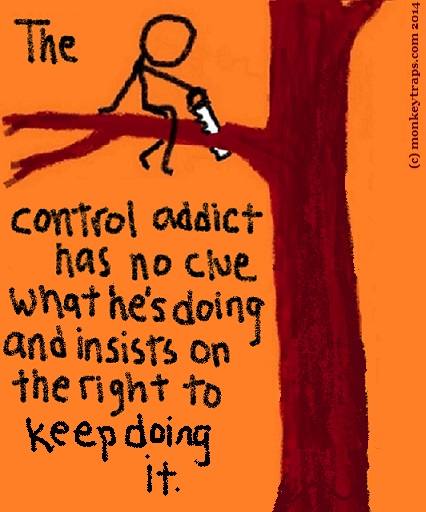
If I’ve learned anything here
it’s that the minute I say You to my wife
it’s Game Over.
~ Craig
Craig belonged to one of my therapy groups, where I spend lots of time encouraging members to avoid You-statements.
You know what a You-statement is. You just read one. (Two, actually.)
It’s a statement someone makes to you about you.
They’re very popular.
We use them all the time. Especially in the heat of battle. As in “You’re wrong” or “You suck.”
But whenever we use them, they tend to be destructive.
They destroy honesty, trust and connection.
In an interpersonal relationship, reliance on You statements – or Yousage, for short – creates a subtle wall between us.
One reason is that to the listener, You feels like an intrusion or an attack. At yet at the same time it’s so common we barely notice it, even when it’s making us uncomfortable.
The biggest problem with Yousage, though, is that it’s inherently defensive.
That’s because when I talk about You I’m not talking about me. I’m directing our conversational attention away from my thoughts, my feelings, what I want. Yousage allows me to stay hidden. And hidden feels safer.
That’s why it’s so much easier to say “You jerk” than “I’m angry at you.” Or “You look terrific” instead of “I’m attracted to you.” Or “You gave an interesting talk” instead of “I had no fucking idea what you were talking about.”
Less vulnerable. Less honest.
Much Yousage occurs at the level of what Fritz Perls called chickenshit — clichéd small talk that avoids emotional contact (How are you?). But it can also be employed at the level of both bullshit (intentional dishonesty or manipulation) and elephantshit (verbal pretentiousness). See “Three types of shit,” below.
So. Say you decide you’d like to grow beyond Yousage. What’s the alternative?
Well, in group I teach one called feedback. It’s a form of communication that relies on I-statements — I think, I feel, I want. The most complete feedback follows the ABC format: When you (A), I feel (B), because (C). That covers all bases. But the one essential is the I-statement at its heart.
Which means it takes courage.
But the results can be startling. When people stop saying You and start saying I in the group room, the atmosphere changes noticeably. The energy level jumps. Suddenly everyone’s there, emotionally speaking, in a way people rarely are with each other. And then real therapy can happen.
But you don’t need a group to practice this. Just a desire to improve your communication with people to whom you’d like to feel closer.
First, try noticing how often you say You.
Then, try saying it less.
Try I instead.
* * *
According to Fritz Perls (1893–1970), founder of the Gestalt school of psychology, there are three kinds of shit you are likely to run into while talking with people:
(1) Chicken-shit is clichéd small talk, devoid of actual information content, small talk that avoids emotional contact.
(2) Bull-shit refer to out-and-out lies. All lies are told for one of three reasons: to conceal the truth and wrong-doing, to protect someone, and/or in order to gain (money, prestige, sex, etc.).
(3) Elephant-shit refers to grandiose plans that avoid confronting reality and responsibility. For example, telling people what you’ll do when you when the lottery
Chicken-shitters are fearful of human contact and often harbour secrets. Bull-shitters are opportunists. Elephant-shitters are full of plans that have no hope of ever coming true.
~ From “The three types of shit,” at http://isthisshit.com/




![[24] 181. 95% of what we worry about [E]](https://monkeytraps.files.wordpress.com/2014/02/24-181-95-of-what-we-worry-about-e.jpg?w=490&h=303)

![36. For those who are in pain [B]](https://monkeytraps.files.wordpress.com/2014/02/36-for-those-who-are-in-pain-b.jpg?w=490&h=258)



![23. Only connect [B]](https://monkeytraps.files.wordpress.com/2014/02/23-only-connect-b.jpg?w=490&h=297)

![[5] 69. Control is like a knife [C]](https://monkeytraps.files.wordpress.com/2014/02/5-69-control-is-like-a-knife-c.jpg?w=490&h=302)

![149. You're only as young as [B]](https://monkeytraps.files.wordpress.com/2014/02/149-youre-only-as-young-as-b.jpg?w=490&h=238)




